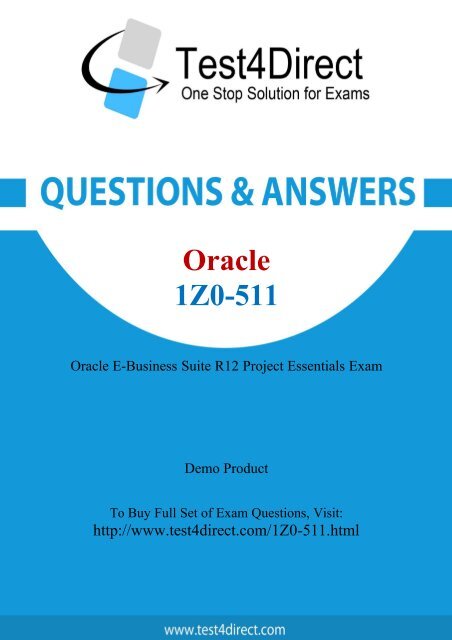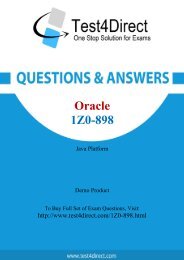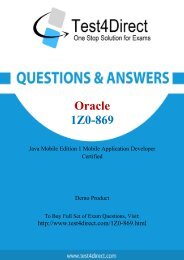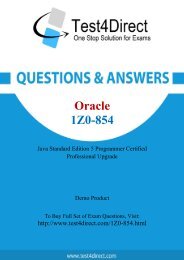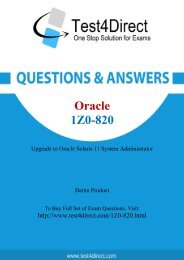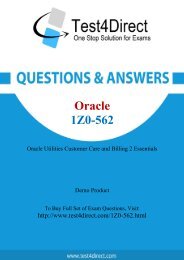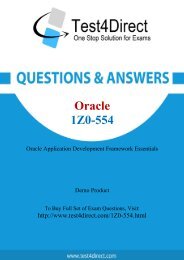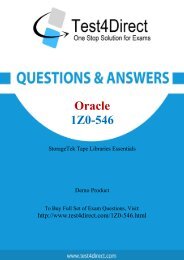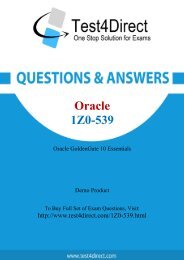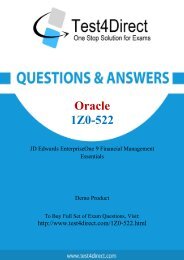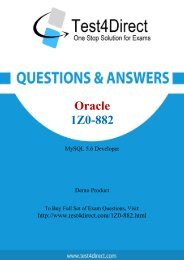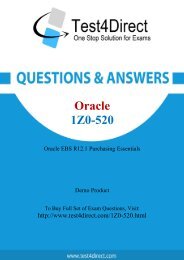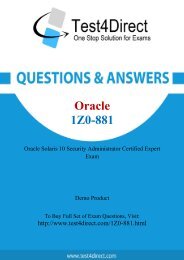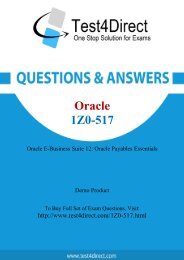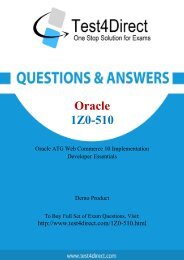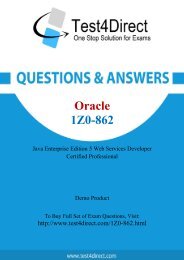1Z0-511 Real BrainDumps
Test4Direct provides latest PDF questions of Oracle 1Z0-511 exam. You have an opportunity to pass the Oracle 1Z0-511 exam in one go. Test4Direct is most accurate source to prepare Oracle 1Z0-511 exam as your success will become site’s responsibility after purchasing 1Z0-511 exam product. There are also lots of discounts and promotion offers that you can avail. Let’s try a free demo http://www.test4direct.com/1Z0-511.html
Test4Direct provides latest PDF questions of Oracle 1Z0-511 exam. You have an opportunity to pass the Oracle 1Z0-511 exam in one go. Test4Direct is most accurate source to prepare Oracle 1Z0-511 exam as your success will become site’s responsibility after purchasing 1Z0-511 exam product. There are also lots of discounts and promotion offers that you can avail. Let’s try a free demo http://www.test4direct.com/1Z0-511.html
You also want an ePaper? Increase the reach of your titles
YUMPU automatically turns print PDFs into web optimized ePapers that Google loves.
Oracle<br />
<strong>1Z0</strong>-<strong>511</strong><br />
Oracle E-Business Suite R12 Project Essentials Exam<br />
Demo Product<br />
To Buy Full Set of Exam Questions, Visit:<br />
http://www.test4direct.com/<strong>1Z0</strong>-<strong>511</strong>.html
Question: 1<br />
Your customer has set up a contract project with a distribution rule Work/Work. Identify three setup<br />
options to:<br />
1. Charge labor transactions revenue and all other nonlabor transactions revenue to separate<br />
accounts<br />
2. Generate separate invoice line amounts for labor and nonlabor transactions<br />
A. Set up revenue categories as required.<br />
B. Define revenue accounts at the revenue category setup level.<br />
C. Define AutoAccounting rules to derive revenue account based on revenue category.<br />
D. Define grouping option by revenue category on the invoice format and attach the invoice format<br />
at the project type level.<br />
E. Define grouping option by revenue category on the project type.<br />
Answer: A, C, D<br />
Explanation:<br />
Note:<br />
Revenue and Billing Information<br />
When you enter revenue information for your project, you specify a revenue distribution rule for the<br />
revenue accrual method and the billing method for this project. When you enter billing information,<br />
you specify invoice formats, bill cycle days, and other invoicing information.<br />
The project type determines which revenue distribution rule appears as the default value for this<br />
field, and which other revenue distribution rules you can choose from. Oracle Projects predefines the<br />
following revenue distribution rules:<br />
Cost/Cost Accrue revenue and bill using the ratio of actual cost to budgeted cost (percent<br />
spent).<br />
Cost/Event Accrue revenue using the ratio of actual cost to budgeted cost (percent spent), and<br />
bill based on events.<br />
Cost/Work Accrue revenue using the ratio of actual cost to budgeted cost (percent spent), and<br />
bill as work occurs.<br />
Event/Event Accrue revenue and bill based on events.<br />
Event/Work Accrue revenue based on events, and bill as work occurs.<br />
Work/Event Accrue revenue as work occurs, and bill based on events.<br />
Work/Work Accrue revenue and bill as work occurs.<br />
Question: 2<br />
Identify two predefined transaction sources that Oracle Projects uses to import the transactions<br />
generated within Oracle Projects.<br />
A. Oracle Interproject Supplier Invoices<br />
B. Oracle Projects Intercompany Supplier Invoices<br />
C. Project Allocations<br />
D. Capitalized Interest
E. Oracle Interprojed Customer Invoices<br />
Question: 3<br />
Answer: C, D<br />
Explanation:<br />
Oracle Projects uses predefined transaction sources to import project allocations and capitalized<br />
interest transactions that it generates internally.<br />
Reference: Oracle Projects Implementation Guide , Transaction Sources<br />
Refer to the exhibit.<br />
In your company's Expenditure/Event Organization Hierarchy, organization labor costing rules are<br />
assigned to all organizations except San Jose. What happens when you run the "PRC: Distribute labor<br />
costs" program for a timecard transaction entered by an employee from the San Jose organization?<br />
A. The rule assigned for San Francisco takes precedence and the transaction will he successfully a<br />
distributed.<br />
B. The rule assigned for USA takes precedence and the transaction will he successfully cost<br />
distributed.<br />
C. The rule assigned for California takes precedence and the transaction will be successfully cost<br />
distributed.<br />
D. The program ignores this transaction, because no labor costing rule is assigned for San Jose. and<br />
completes normally.<br />
E. The program completes normally. However, the output will have this transaction under the<br />
exceptions section with a message "No Labor costing rule assigned for organization."<br />
Question: 4<br />
Which two options are not task attributes for financial task structure?<br />
A. Task Type<br />
B. Service Type<br />
Answer: C
C. Work Type<br />
D. Chargeable Flag<br />
E. Scheduled Dates<br />
Question: 5<br />
Question: 6<br />
Answer: B, D<br />
Explanation:<br />
Incorrect:<br />
Not A: Task types assign default attributes to tasks and control how Oracle Projects processes tasks.<br />
Task types specify basic task attributes.<br />
Not C: Work types represent a classification of work. You use work types to classify both actual and<br />
scheduled work.<br />
Not E: Oracle Projects uses start and finish dates to control processing, indicate estimated and<br />
scheduled duration, and serve as tools to evaluate project performance.<br />
The start and finish dates at the project level are:<br />
Actual: Actual dates when work on the project started and finished. You can use these dates to drive<br />
future timecard and earned value functionality.<br />
(not E) Scheduled: Scheduled start and finish dates for the project.<br />
Target: The expected lifespan of the project.<br />
Estimated: A task manager's estimate of when work on the project will be started and finished.<br />
Baseline: The baselined schedule<br />
A new contract project is created for work for a customer by using event-based billing. A decision has<br />
been made to give a discount to the customer on a particular invoice. You want to apply this discount<br />
and reduce the invoice without affecting revenue. Which event type should be used to achieve this?<br />
A. Manual<br />
B. Invoice Reduction<br />
C. Deferred Revenue<br />
D. Automatic<br />
E. Scheduled Payment<br />
Answer: D<br />
Explanation:<br />
Event Type Classification is: Scheduled Payment, Deferred Revenue, Invoice Reduction, Manual, or<br />
Automatic (for billing events only)<br />
In which two circumstances would it be appropriate to deselect the "Interface Revenue to GL" option<br />
in System Implementation Options, before you run the Interface to GC?<br />
A. During data migration if Revenue is already in General Ledger<br />
B. When Revenue is handled in Accounts Receivable<br />
C. When AutoAccounting is incorrect and the Revenue interfacing to General Ledger needs to be put<br />
on hold.<br />
D. When Finance wants to reconcile Unbilled Receivables/Unearned Revenue
E. When Revenue was generated in error for all projects in Released status, and needs to be<br />
corrected.<br />
Question: 7<br />
Answer: A, B<br />
Explanation:<br />
A: If the revenue amounts are already interfaced to General Ledger (GL) through a different interface,<br />
then uncheck the ‘Interface Revenue to GL’ option in the implementation options and run the<br />
‘Interface Revenue to GL’ process in Oracle projects. This will turn the flags in the revenue records as<br />
accepted in GL, though it is not interfaced. Once this is done, revert back the implementation option<br />
back to its original state.<br />
What type of project will a company require to use Organization Forecasting?<br />
A. contract project<br />
B. Administration Project<br />
C. Organization Planning Project<br />
D. capital project<br />
E. multi-function project<br />
Answer: A<br />
Explanation:<br />
Note:<br />
* Compute Forecast Labor Revenue<br />
This process calculates the potential revenue of labor expenditure items based on established bill<br />
rates and markups. The expenditure items that the process selects are billable labor expenditure<br />
items charged to contract projects that have not yet been processed by the Generate Draft Revenue<br />
process. The items do not have to be approved to be processed for forecast revenue.
THANKS FOR TRYING THE DEMO OF OUR PRODUCT<br />
Visit Our Site to Purchase the Full Set of Actual <strong>1Z0</strong>-<strong>511</strong> Exam Questions With Answers.<br />
http://www.test4direct.com/<strong>1Z0</strong>-<strong>511</strong>.html<br />
We Also Provide Practice Exam Software That Simulates <strong>Real</strong> Exam Environment And Has<br />
Many Self-Assessment Features. Download Free Product Demo From:<br />
http://www.test4direct.com/<strong>1Z0</strong>-<strong>511</strong>.html<br />
Money Back Guarantee<br />
Check Out Our Customer Testimonials


